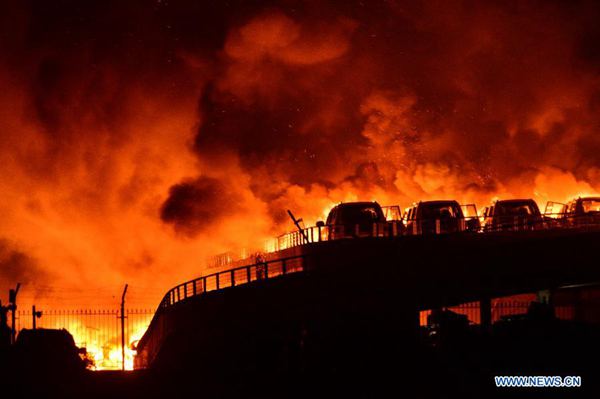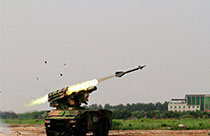

 |
| Photo taken on Aug. 13, 2015 shows the burning scene of the explosion site in the Binhai New Area in north China's Tianjin Municipality. (Xinhua) |
Top prosecutors in China on Thursday announced they are investigating 11 officials and port executives for dereliction of duty and abuse of power for the deadly Tianjin explosions that have killed at least 145 people.
Another official with the Tianjin Municipal Transportation Commission, an agency that supervises the movement of hazardous chemicals, allegedly jumped to his death from his office Wednesday morning, reports said on Thursday. Dong Yongcun was reportedly in charge of administrative approvals, and it was unclear whether his death was related to the blasts.
Those under investigation include Wu Dai, head of Tianjin Municipal Transportation Commission, and Zheng Qingyue, president of the Tianjin Port Group, the Supreme People's Procuratorate (SPP) said.
Wang Jinwen, a senior official at the Ministry of Transport, is also being investigated for possible abuse of power. Wang was allegedly found to have violated the law by helping the owner of the warehouse pass safety evaluations and obtain approvals to handle hazardous materials.
The officials have been detained.
A separate statement from the Ministry of Public Security (MPS) on Thursday said police have detained 12 people involved in the massive explosions, including Yu Xuewei, chairman of Tianjin International Ruihai Logistics Co Ltd, owner of the warehouse that exploded.
The vice-chairman of the company, Dong Shexuan, and Zeng Fanqiang, an employee at a safety evaluation firm suspected of illegally helping Ruihai acquire safety evaluation papers, were also detained for illegally storing dangerous materials, the MPS said.
Poor port management
Analysts said they are concerned with China's port management, especially in safety planning and risk response, after the blasts ripped through the Tianjin port on August 12 where large amounts of toxic chemicals were stored, including 700 tons of sodium cyanide.
By Thursday, the death toll stood at 145 people with 28 others still missing, including 16 firefighters and two policemen.
"The blasts are the result of chaotic port management, where several agencies, including local transportation authorities and governments, have overlapping functions," Wang Hongwei, an associate professor at the Renmin University of China, told the Global Times.
"We have been obsessed with the economic benefits, but the blasts are a sign of the safety risks involved," said Wang.
He urged authorities to better protect and manage critical infrastructure, which should clearly outline responsibilities and strengthen risk and disaster response. "They should also factor in terrorist attacks and natural disasters."
The SPP said local government departments, including transportation management authorities, production safety regulatory agencies and land and resources authorities are all accountable for the explosions.
Customs personnel of the Tianjin Customs District were also found to have been lax and irresponsible in supervising the illegal hazardous chemical business run by Ruihai, the SPP added. The personnel involved are also suspected of illegally issuing the company customs clearance permits and allowing it to engage in illegal business activities.
Tianjin Port Group is also responsible for the accident because it failed to respond to potential safety risks and Ruihui's illegal business activities, the SPP added.
Homeowner conflicts
Meanwhile, about 500 residents whose homes were damaged by the deadly blasts rallied outside the Tianjin government Thursday, demanding that authorities purchase their properties and provide compensation for their losses.
A resident surnamed Gao told the Global Times that 12 protesters were taken away at midday after conflicts broke out between residents and the police.
The government of the Binhai New Area, where the blasts occurred, announced Thursday that they will offer a monthly subsidy of 2,000 yuan ($312) for some residents whose apartments were damaged. Reports said the blasts shattered apartment windows and cut water and power supply.
The blasts have affected 17,000 households in seven residential communities, according to the Xinhua News Agency.
As of Thursday, eight real estate companies have agreed to purchase damaged buildings, news website thepaper.cn reported.
Among them, a developer affiliated to China Vanke Co Ltd, one of China's largest real estate firms, said that they are willing to terminate contracts for the unfinished residential building if customers choose to do so.
 'Enemy planes' intercepted by Hongqi-7B air-defense missiles
'Enemy planes' intercepted by Hongqi-7B air-defense missiles Blind date with bikini girls in Nanjing
Blind date with bikini girls in Nanjing Amazing photos of Chinese fighter jets
Amazing photos of Chinese fighter jets Chinese soldiers participate in training for V-Day parade
Chinese soldiers participate in training for V-Day parade Painting: Lonely women in Forbidden City
Painting: Lonely women in Forbidden City China and Russia hold joint drill in Sea of Japan
China and Russia hold joint drill in Sea of Japan 'Goddess' in Taiwan McDonald's
'Goddess' in Taiwan McDonald's Female soldiers at military parades
Female soldiers at military parades Photos of campus belle doing splits go viral
Photos of campus belle doing splits go viral The killing pools
The killing pools Parsing China's massive V-day parade
Parsing China's massive V-day parade Hype against economic model unjustified
Hype against economic model unjustified US wants China to receive deported immigrants in exchange for extradition of corrupt officials: experts
US wants China to receive deported immigrants in exchange for extradition of corrupt officials: expertsDay|Week